Sleep Apnea Treatment – Danville
Get the Quality Night of Sleep You Deserve
Sleep apnea is one of the three most common sleep disorders. Unfortunately, the wide range of symptoms makes it difficult to accurately diagnose sleep apnea, and many patients remain undiagnosed or misdiagnosed for years. At Danville Dental Associates, we offer a wide range of dentistry services, and that includes sleep apnea screenings and therapy. Dentists have years of advanced training and experience in how the oral and facial structures interact, including the airway. While you may not think of visiting one of our offices for sleep apnea therapy, we may be the best option. Call our team to find out more or schedule a sleep apnea consultation in one of our five Danville and Chatham office locations.
What Is Sleep Apnea?
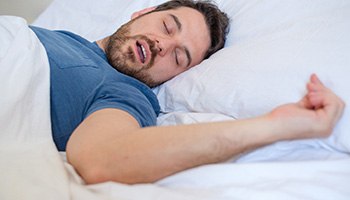
Sleep apnea is a common sleep disorder affecting millions of US adults yearly. Apnea is the cessation of breathing for ten or more seconds at a time during sleep. While anyone can experience a few apnea incidents during the night, patients who suffer from sleep apnea may experience hundreds or thousands of these apnea events during a single night. There are two main types of sleep apnea, obstructive and central sleep apnea. The less common type is central sleep apnea, and it occurs when the brain fails to signal the body to inhale during sleep. The more common form of sleep apnea is obstructive sleep apnea. As the name suggests, this form of apnea occurs when the airway is blocked during sleep. More advanced medical treatments may be necessary for patients suffering from central sleep apnea, but for those patients with obstructive sleep apnea, a comfortable, portable, custom oral appliance from our dentists may provide adequate relief, allowing patients to rest peacefully, breathe deeply, and sleep soundly.
The Warning Signs of Sleep Apnea

Because the side effects and warning signs of sleep apnea are so varied, many patients suffer from sleep apnea for years before a diagnosis is made. If you experience any combination of the following symptoms, you may want to seek a diagnosis of sleep apnea:
The Dangers of Sleep Apnea

In addition to the frustrating symptoms listed above, sleep apnea can have a variety of detrimental effects. If you are lacking quality sleep, you likely struggle with focus, memory, mood, and reaction time. Untreated sleep apnea can also increase your risk of developing heart disease and experiencing a cardiovascular event – like a heart attack. Pregnant women with untreated sleep apnea are also more likely to have pre-term birth due to an increase in blood pressure. Ultimately, if you are experiencing symptoms of sleep apnea, it’s a good idea to seek help from a professional to get to the root of the problem.
Risk Factors for Sleep Apnea

Some patients are at a higher risk for sleep apnea than others, so it’s even more important that you let our team or a trusted sleep doctor know right away if you experience any warning signs of sleep apnea. The most common risk factors for sleep apnea include:
- Neck circumference greater than 17 inches for males or 16 inches for females
- High blood pressure
- Body mass index greater than 35 kg/m2
- Greater than 50 years of age
- Males are much more likely to suffer from sleep apnea
Sleep Apnea Treatment Options
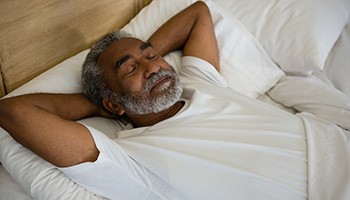
CPAP (continuous positive airway pressure) machines are a popular option for addressing sleep apnea. This treatment involves the patient wearing a mask over their nose and/or mouth while they sleep. Through the mask, the air is constantly being projected into the body, keeping the airway open. CPAP therapy is an excellent solution for many, especially those with severe sleep apnea. However, others find the mask to be bulky, the machine loud, and the whole experience uncomfortable.
At Danville Dental, we offer a more conservative and comfortable alternative: oral appliance therapy. Made from acrylic and custom-fitted to your mouth, this treatment involves wearing a nightguard that keeps your lower jaw in a position that prevents the airway from being obstructed during sleep. Through oral appliance therapy, many patients are able to find relief.
Understanding the Cost of Sleep Apnea Treatment

The cost of sleep apnea treatment can depend on a few factors. During your consultation, our team will be happy to share some specific numbers with you. We can also help you explore your payment options, such as convenient financing through CareCredit. We do not want you to run into any unpleasant surprises when paying for your treatment, so do not hesitate to ask questions. Remember, sleep apnea therapy is a wise investment in your daily quality of life and your long-term health!
Does Dental Insurance Cover the Cost of Sleep Apnea Treatment?
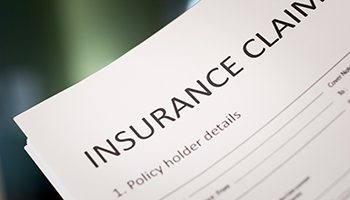
The primary goal of dental insurance is to help patients take good care of their teeth and gums. Since sleep apnea is more of a systemic health problem, you should not expect your dental policy to apply to your treatment. However, you might be able to use your medical insurance instead.
Factors That Affect the Cost of Sleep Apnea Treatment
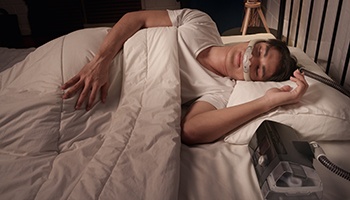
The cost of your treatment might be influenced by:
- Your insurance coverage. Our team is not in-network with any medical insurance plans, but we can still help you with filing claims if your policy applies to out-of-network benefits. Often, health insurance covers both sleep apnea testing and treatment.
- The type of treatment. CPAP therapy, oral appliance therapy, and combined therapy may all come at different price points. The specific appliances you use can also have a bearing on cost.
Treat Your Sleep Apnea Now to Improve Your Health and Save Money

Sleep apnea treatment might seem a bit pricey on the surface. However, its potential to protect your health can improve your quality of life and help you save money in the long run. Here are some examples of how it might do that:
- Lower risk of disease. High-quality sleep may reduce your risk of issues like heart attack, stroke, type 2 diabetes, and dementia. Therefore, it may lead to lower medical costs throughout your lifetime.
- Lower risk of accidents. Being well-rested can help you stay alert when you are driving and carrying out other potentially dangerous tasks.
- Increased work performance. Taking care of your health may help you reach your career goals.
Making Sleep Apnea Treatment More Affordable

To make your sleep apnea treatment more affordable, you might take advantage of:
- You may qualify for a low-interest payment plan through a third-party lender, such as CareCredit.
- Cash discounts. We offer a 5 – 10% discount for patients who pay upfront with cash, check, or credit cards (CareCredit is excluded).
Your Sleep Apnea Consultation
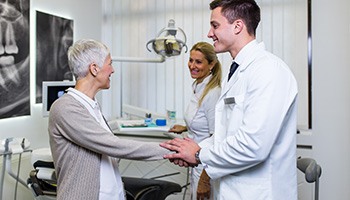
During your sleep apnea consultation with our team, we’ll begin by walking you through a questionnaire to help you determine whether or not you should proceed with sleep testing. If we determine you are likely to be suffering from sleep apnea, we’ll work with a trusted sleep doctor to conduct a sleep test. If you have already been diagnosed with sleep apnea but find yourself unable to adjust to CPAP treatment, we can begin creating a personalized treatment plan using an oral appliance or combined therapy.
Sleep Apnea FAQs
Does Everyone Who Snores Have Sleep Apnea?
No, not everyone who snores has obstructive sleep apnea (OSA), just like not everyone with OSA snores. Snoring and sleep apnea are two separate issues. The former is simply the sound that is created when air moves past tissues in your throat, while the latter is characterized by actual pauses in breathing.
Of course, it is important to note that snoring and sleep apnea do often go hand-in-hand. That is because the same tissues that vibrate when air moves also have the potential to obstruct breathing. If your snoring is loud and frequent, there is a good chance you have a sleep disorder.
How Long Are Apnea Events or Episodes?
Sleep apnea episodes are 10 seconds or longer, and in some cases, they last for up to 2 minutes. These incidents, known as apneas or hypopneas (a hypopnea is an episode of reduced airflow, whereas an apnea is a total pause in breathing) may occur 5 – 30 times each hour.
A sleep test can reveal whether you experience these episodes, how long they last, and how frequent they are. 5 – 15 episodes per hour is classified as mild sleep apnea, whereas 30 or more per hour qualifies as severe OSA.
Will My Sleep Apnea Go Away If I Lose Weight?
In some individuals, sleep apnea occurs because an excess of fatty tissue around the neck or abdomen places pressure on the airway. If that is true in your case, losing weight might reduce or even eliminate your symptoms.
Of course, it is also important to note that in some cases, OSA is completely unrelated to weight. It may be due to a range of factors, so even if you lose weight, you should still consult with a qualified doctor who can help monitor your condition.
How Can I Travel with Sleep Apnea?
CPAP machines are allowed on airplanes, but traveling with one can be inconvenient. Fortunately, oral appliances from a sleep dentist are easy to travel with. Your appliance and its storage case are easy to slip into your luggage, so you never have to be without it, even if you are traveling to a remote area with minimal electricity and other resources.
Try to stick to your normal sleep routine while you are away from home. Doing so will lower the risk that your symptoms will be exacerbated.
How Soon After Starting Sleep Apnea Treatment Will I Notice Improvement?
You may notice an improvement in the quality of your sleep after just a few nights of using your oral appliance; some people experience a difference right away! Of course, keep in mind that it still might take a bit of time to adapt to your appliance. If you find it difficult to wear, try keeping it in your mouth for short periods while you are awake so your body can get used to how it feels.
